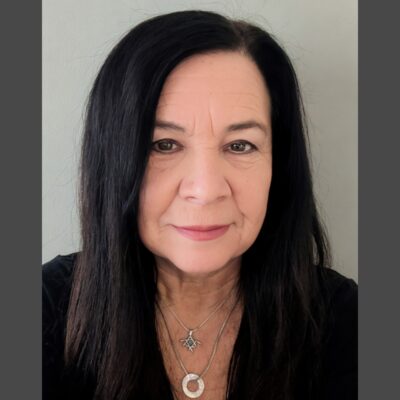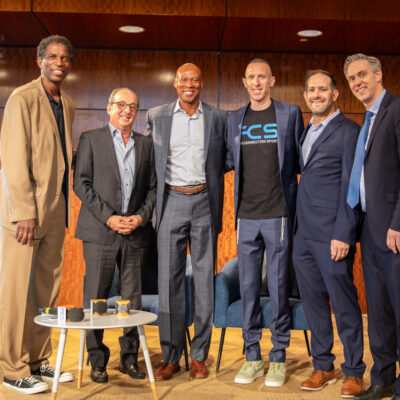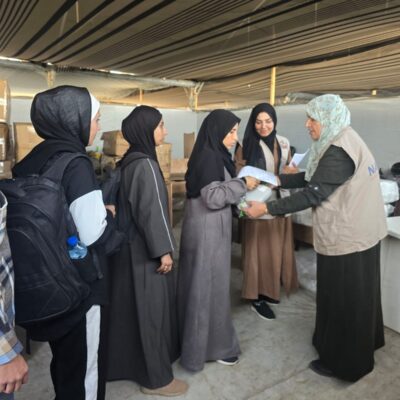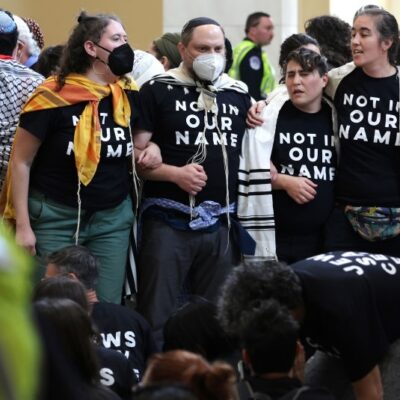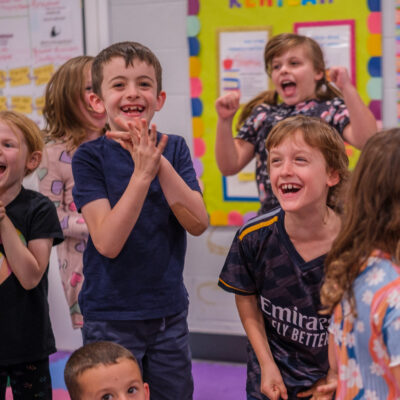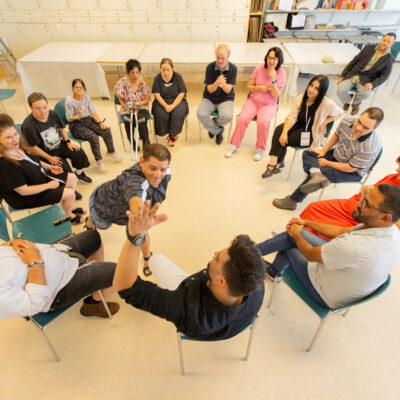FUTURE FOUNDATION
Slingshot study shows young donors grateful for elders, looking for a seat at the table
New survey of the next generation of Jewish philanthropists shows a group that is overwhelmed, yet determined

GETTY IMAGES
Illustrative. A person hands a baton to the next runner in a relay race.
A recent study of young Jewish philanthropists asked participants to select images that evoke how they feel living in a post-Oct. 7 world. There were AI-generated pictures of people walking alone through the darkness. Another with a person in a fetal position. Broken hearts. Broken windows. Someone suffocating behind a rubber sheet, their mouth agape. And there was a picture of a hand holding a Magen David charm, and another of a hand, this time belonging to a young child, grasping onto the hand of an elder.
All of the images, in one way or another, speak to the feelings of a new generation of philanthropists that is gaining control over vast sums of money and the communal influence that comes with it.
The study, titled “Portrait of Next-Gen Jewish Giving Today,” was released today by Slingshot, a nonprofit supporting young Jewish philanthropic leaders, and conducted by Worthy Strategy Group in partnership with Tobin Belzer, an applied sociologist whose research supports nonprofits. It portrays a group of philanthropists who are overwhelmed, yet determined. They pay respect to their elders, but want a more hands-on, collaborative approach to their philanthropic work.
“We’re on the brink of the largest wealth transfer in history,” Dena Verhoff, a board member of Slingshot and UJA-Federation of New York, who participated in the study, told eJewishPhilanthropy. “We’re facing intractable problems around antisemitism and safety, and this cohort, this generation of people, is deeply invested in addressing these problems while also bringing joy and excitement and enthusiasm.”
Post-Oct. 7, with rising antisemitism in America, the Jewish community has been in “an all-hands-on-deck moment,” Stefanie Rhodes, CEO of Slingshot, told eJP. This study was Slingshot’s contribution to meeting the moment. Young Jewish philanthropists “want to help shape what the Jewish community looks like moving forward, so how do we make sure they’re best prepared?”
The research, funded by Crown Family Philanthropies, Next Gen donors, CCS Fundraising, American Jewish World Service and OneTable, surveyed 31 young philanthropists, mostly ages 20-40, using an online ethnographic approach mixing psychology and neuroscience, where participants answered questions, sometimes speaking through metaphors in a photograph, recording or a song choice, over a period of days.
The study shows a group of passionate young Jewish leaders who view Judaism and philanthropy as an integral aspect of their identity, which was instilled in them from birth, through tzedakah boxes, camps, day schools, bar and bat mitzvah projects and Shabbat table conversations.
Members of the younger generation are grateful for what they learned from elders — grit and a dedication to community, Judaism and service — but want to add their spin to their philanthropic work. They aren’t interested in simply throwing money at a cause, they want to volunteer and see tangible results firsthand. They also view philanthropy as a communal cause, not top-down, but with shared decision-making and inclusion of the entire community.
Making the changes needed to heal the world needs to take an intergenerational, intercultural effort, Jackie Perlmeter, a Slingshot board member who participated in the study, told eJP. Philanthropy was “woven into everything in my family from a young age.”
For her and other young leaders, philanthropy gives them hope in an daunting world, she said. “There’s a lot of fear in the world right now, and people are looking toward their philanthropy and their communities to alleviate that.”
While these leaders are deeply concerned about strictly Jewish matters, they also see the importance of issues such as global warming, gun violence, inequality and democracy. But even as they come at these essential issues from a Jewish perspective, they realize that partnerships with others are needed to effectively address them.
The study also found that these leaders don’t want to wait until their twilight years to get involved in philanthropy, but at the same time, they are juggling families and work and are already feeling burnt out, with not enough time, and say they sometimes feel unwelcome at the philanthropic table. And yet, they refuse to walk away, Rhodes said. “They are looking for real leadership opportunities, not event planning, not inviting my friends to a dinner or a function, but actually, how can I be most useful, how can I assume some leadership?”
Because those in the study are overwhelmed, they yearn for support, especially from peers going through similar situations. They too are insecure about their place in the philanthropic world and are hungry to learn about the causes they care about, especially on polarized topics. “They don’t feel like their wealth makes them ready to lead,” Rhodes said. “It makes it such that they have a responsibility to learn how to.”
Often, these philanthropists feel a pressure to conform, especially those who serve on boards and family foundations. They feel the need to agree with others’ decisions, even if they don’t agree with them. But this generation wants to be allowed to discuss issues with nuance, including around Israel and Palestinian suffering, without feeling their voices stifled.
Seeing the world through a new set of eyes may be a good thing, Rhodes said.
“There’s this expression, ‘Do what you do, get what you got,’” she said. “They will bring new ideas that look different from how things have been done, and maybe that’s OK. Maybe that’s not a bad thing. What does it look like to not ask the older generations to get up and walk away, but just to make some room at the table for some new seats? Maybe collectively, if we take our traditional wisdom and experience with new and innovative ways of approaching the problems we’re facing, that is a way to move through and pass this moment stronger as a community.”
For instance, everyone agrees there is an issue with antisemitism, she said, but there are many views on how to combat it. This new generation interacts with technology and others in ways very different from their elders. They are more multicultural and diverse.
“We have an opportunity” to engage them, Rhodes said. “I hope we take it.”

 Add EJP on Google
Add EJP on Google




